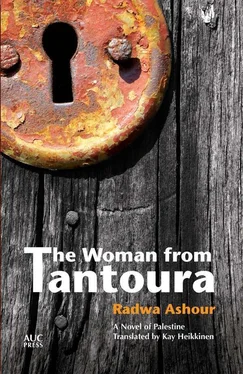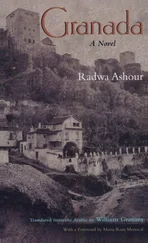My uncle Abu Amin laughed and said, “Congratulations to you both, for … Sadiq .”
The infant was beside me on the bed. I looked up at my uncle and it seemed to me that I was going to say something. I did not speak. I was weak after a long night that seemed like forever. Sounds had escaped from me, driven by that axe that was hitting me mercilessly in my lower back. It shook the body. No, it did not shake it, it convulsed it. It split apart and seemed about to scatter in splinters, or else to collapse and cave in, turning into ruins. Then the pain subsided a bit, as if it was dissipating, almost. Two minutes and then the axe began striking again — is this what a tree feels like when the woodman’s axe strikes it? There was no axe and no tree, it was my body, convulsed in labor. My aunt held my hand and said, “The first birth is like this. You and the baby will be fine, God willing, and it will be easier the next time.” If she would only stop speaking. I couldn’t stand the sound, I couldn’t stand the axe. I clung to her hand and squeezed, maybe the pressure would stop the blow that cut my body in two. I shouted, calling for my father. I shouted his name aloud until it seemed as if all Sidon would hear the name and bring him to me, and he would stop the axe and carry me to safety. Suddenly it stopped. It seemed the baby had slipped out. I closed my eyes, or perhaps my eyes and ears closed of themselves. It was as if I had gone to sleep, or fallen into a coma. I didn’t hear the baby’s cry. I didn’t see him when the midwife held him by his feet and lifted him, smiling, announcing that it was a boy, thank God, and then began to cut the umbilical cord and to wipe off the amniotic fluid that remained in his hair and on his body. She must have put him beside me as I was unconscious. I was aware only of my body, tense under the pressure of a pain that was no longer completely there, as if it had slipped from waking to sleep. They all saw the boy before I did. In later years when I had Hasan and then when Abd al-Rahman came, I was conscious, I saw and heard, and I stretched out my hand to hold the new boy. But as for Sadiq, I found him wrapped in white diapers on the bed beside me, when I was roused by my uncle’s voice saying, “Thank God for the safe delivery! Congratulations to you both, for … Sadiq .” I opened my eyes and saw Amin’s face, pale and exhausted as if he had spent the night in labor. He gave me a bashful smile, and kissed my head. He didn’t say anything.
For a moment I wanted to turn my face to the wall, because I was tired and wanted to sleep, or to go far away, alone. I found myself looking at the boy, enjoying him: his hair was black and smooth, his locks covering the top of his forehead. He had a small face and features, a long face, and his eyes were shut. His hands appeared from the swaddling, looking like two rounded, soft pieces of dough; it looked as if some hand had pressed on each of them several times, forming dimples from which grew slender fingers, how long it was hard to tell, since they were closed and contracted like that. I couldn’t stop looking at the baby. My aunt brought him to me, here he was in my arms. I felt a tickle in my breast, which had not happened to me before. At the time I didn’t identify it as the rush of the milk.
My mother was not present for the birth of any of her three grandchildren. Would the name have made her joyful or sad, would she have blessed it or suggested another name instead? That night, thinking stopped at this question which flitted through my mind, landing in a corner and returning later, after a week or two or three, then disappearing completely, not to return.
My uncle Abu Amin was the one who named Sadiq and Hasan. He named them after I had them, for he did not give names before the birth; first he made sure of the health of the mother and the child, and then he gave the name. When I conceived the third boy I announced when I was still pregnant, in my fifth month, “If it is a girl I will name her Wisal, and if it is a boy he will be Abd al-Rahman.”
11
A Young Man’s Laughter
Ezzedin announced, laughing, “Some people have all the luck! Mulukhiya soup and a job and a scholarship, all on the same day! Of course the mulukhiya is the most important. We’ve eaten the mulukhiya, and now I have to choose: the job or studying in the university? In fact, I have chosen.”
Ezz loves mulukhiya and he loves it more when I make it for him. He turns the table into a carnival of laughter. He announces loudly, “Ruqayya’s mulukhiya can’t be beaten, she makes it better than my mother and my aunt and all the women of Sidon.” I signal to him with my eyes because I know that my aunt is annoyed by this talk, but he ignores my signal and expands on his love for his favorite dish, on the condition that it comes from my hands, because it strengthens the heart, hardens the bones, extends life and assures that no one will defeat the Arabs, despite all appearances to the contrary — and in all certainty, it will return Palestine to us! We laugh.
I don’t know what the house would have been like, or how it would have been with my uncle and aunt, if Ezz had not been living with them. With his spontaneity he drew them into a bubbling cauldron of life, with his comings and goings, his comments and his stories and his endless wit. There was also the political news he would bring to his father; Abu Amin would listen with interest, and it would be followed by a long discussion about the possible and the impossible. Sometimes it seemed to me that Ezz could make friends with a passing breeze. He would introduce everyone to everyone, and his friends would become friends with each other, and his associates’ friends would become his friends. He would open the house to them, introduce them to his mother and father and then introduce the family to his family, and they would visit each other and form friendships. The house was never without guests: “This is my friend from Amqa, these guys are from al-Zeeb and they live in Ain al-Helwa, this family is from al-Tira and I invited them to lunch with us.” “Mother, what do you think about their daughter, isn’t she beautiful?” “Her eyes are small, Ezz … the girl who came with her brother two days ago, the girl from Safsaf, is prettier, her eyes are a beautiful black and her figure is like a gazelle’s!” My aunt is bothered by all the guests, but she busies herself with greeting and hosting them, and they take her, unawares, into their stories and anecdotes, into what happened and how it all ended. When they have gone and she’s overcome with exhaustion she sleeps deeply and peacefully, in spite of everything. Abu Amin, also, has earned standing among many young men: they greet him in the streets of Sidon, they come up to him happily when they see him in the coffee shop, and they come often to the house to ask about him, to consult him, and to listen to his stories.
I said to Ezz, “As long as you’re going to go and live in Beirut, I’ll ask my aunt and uncle to move in with us.”
“Who told you I was going to move to Beirut?”
“Didn’t you say that you got a scholarship?”
“I’m not going to accept it!”
Amin joined in, “What do you mean? A scholarship from the agency for study at the American University, what crazy person would refuse that?”
“I graduated from school and that’s enough. I have an offer of work as a teacher in the agency. My mind tells me, take the job, boy, stay with the old ones and with your friends and do work you love.”
“We’re here with the old ones. Your friends won’t fly away, and anyway Beirut isn’t America, you can come back every weekend.”
I left them talking and got up to make the coffee.
I returned with the coffee and found them downcast. I surmised that they had disagreed, and I tried to dissipate the tension by telling them about a new sentence Sadiq had come up with that I thought was witty, but it didn’t interest them. Ezz drank his coffee, said goodbye, and went out.
Читать дальше












